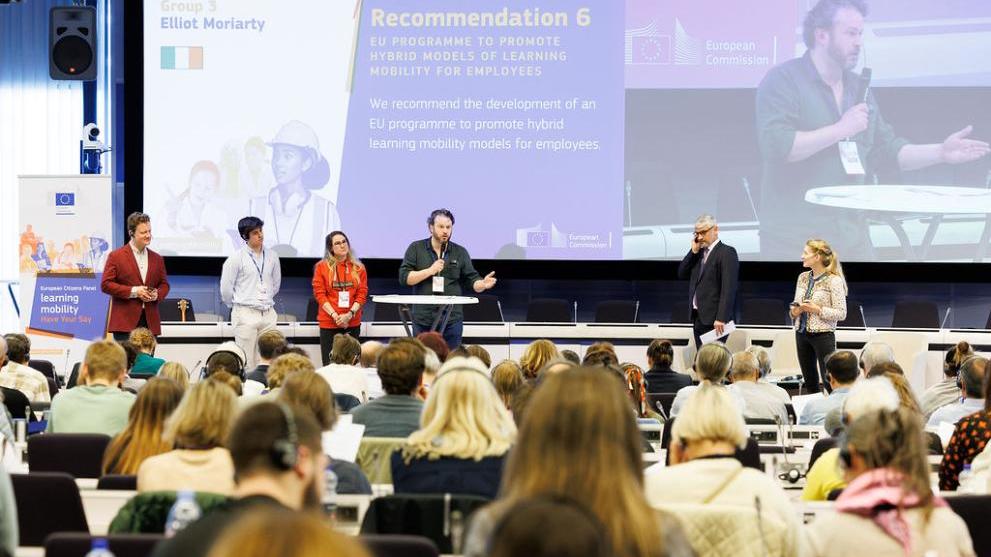Call for more citizens' assemblies in the EU

41 European democracy organisations are calling on the European Union (EU) to strengthen randomly selected citizens' assemblies at all levels. An open letter to this effect was written by the association "Mehr Demokratie" together with the organisations G1000 (Belgium), Bureau Burgerberaad (Netherlands), DemNet (Hungary), DemocracyNext, FIDE (both international) and the Shipyard Foundation (Poland) and signed by other organisations.
The Democracy Alliance calls on the European Commission, the European Parliament, the European Council and the Belgian Presidency of the Council of the European Union to invest in citizens' assemblies in order to strengthen European democracies. "By embracing deliberative democratic methods, we can not only enhance the legitimacy and effectiveness of decision-making but also nurture a sense of ownership and solidarity among citizens." the letter states.
Disillusionment and alienation
Deliberative democracy (borrowed from the Latin deliberatio 'deliberation') emphasises public discourse, public consultation, the participation of citizens in public communication and the interaction of deliberation and decision-making processes. Citizens' assemblies are referred to as deliberative processes. The signatories of the open letter thus want to strengthen European democracy.
The letter states: "Democracy lies at the heart of our European values, embodying our shared principles such as freedom, equality and justice. However, we are arriving at a crucial momentfor our democracies. Antidemocratic forces have been gaining momentum, both at the borders of the EU and within several Member States. We see increasing disillusionment and disengagement, reflecting a widening gap between citizens and their representatives, but also between citizens and democracy itself."
Preserving the status quo is not enough
This trend emphasises the need for bold measures to strengthen democratic institutions and procedures, but simply preserving the status quo is not enough to counter the threats to democratic values and stability.
"As we navigate the complex challenges of the 21st century, it is imperative that our democratic institutions and political culture evolve as well, to better reflect and represent the needs and values of our diverse citizenry," the democracy organisations demand. This could be achieved by involving citizens more actively in political decision-making processes. One proven method for this is the use of randomly selected citizens' assemblies to make political decision-making processes more inclusive.
Citizens' assemblies in almost all EU member states
According to the Democracy Alliance, citizens' assemblies are now taking place in almost all EU member states, increasing the legitimacy and quality of democratic procedures. "By providing a space for dialogue between people with very different backgrounds and views, Citizens’ Assemblies depolarise debates around key societal issues," the open letter states. Deliberative democracy even has the potential to initiate a larger dialogue on issues concerning the future of the European Union.
"Many deliberative processes are ad hoc, one-off experiments that are insufficiently connected to existing policy-making processes and governance structures, making it difficult for the results of Assemblies to be incorporated into policy," the signatories of the open letter state. Furthermore, not all of these processes fulfil the essential quality standards required for honest, transparent and legitimate citizen participation. This increases the risk that citizens' deliberations could be misused for "citizen washing".
The common concern of the democracy organisations:
A clear vision for Citizen Deliberation: Embed citizen deliberation objectives in the EU’s 2024-2029 Strategic Agenda, ensuring they meet high-quality standards and evaluation criteria to prevent ‘citizen washing’.
Structural Integration of Deliberative Citizens’ Assemblies: Incorporate Citizens’ Assemblies into EU political processes, including on contentious issues. Institutionalise deliberative processes and create a permanent Citizens’ Assembly with a clear mandate. Create a horizontal DG or unit tasked to coordinate the work on citizen participation and deliberation.
Create the conditions for robust processes in all Member States: Invest in building deliberative capacity across the EU. Dedicate financial resources to communities that don’t have the opportunity to organise deliberative processes.
Democratic odyssey
For some time now, Mehr Demokratie has been working together with many other European democracy organisations, democracy researchers and democracy promoters on a project with the unusual title "The Democratic Odyssey". The Odyssey aims to make the idea of an ecosystem of democratic participation in the EU more tangible, together with all those who care about the development of democracy.
The aim of the Odyssey is to develop a vision of how a permanent citizens' assembly can be established in the EU and how it can be endowed with true legitimacy and impact. Unlike other mini-publics, permanent citizens' assemblies have a legal basis and a permanent organisational structure. There are examples of this in Aachen, Brussels, Milan, East Belgium and Paris, among others.
Learn more: